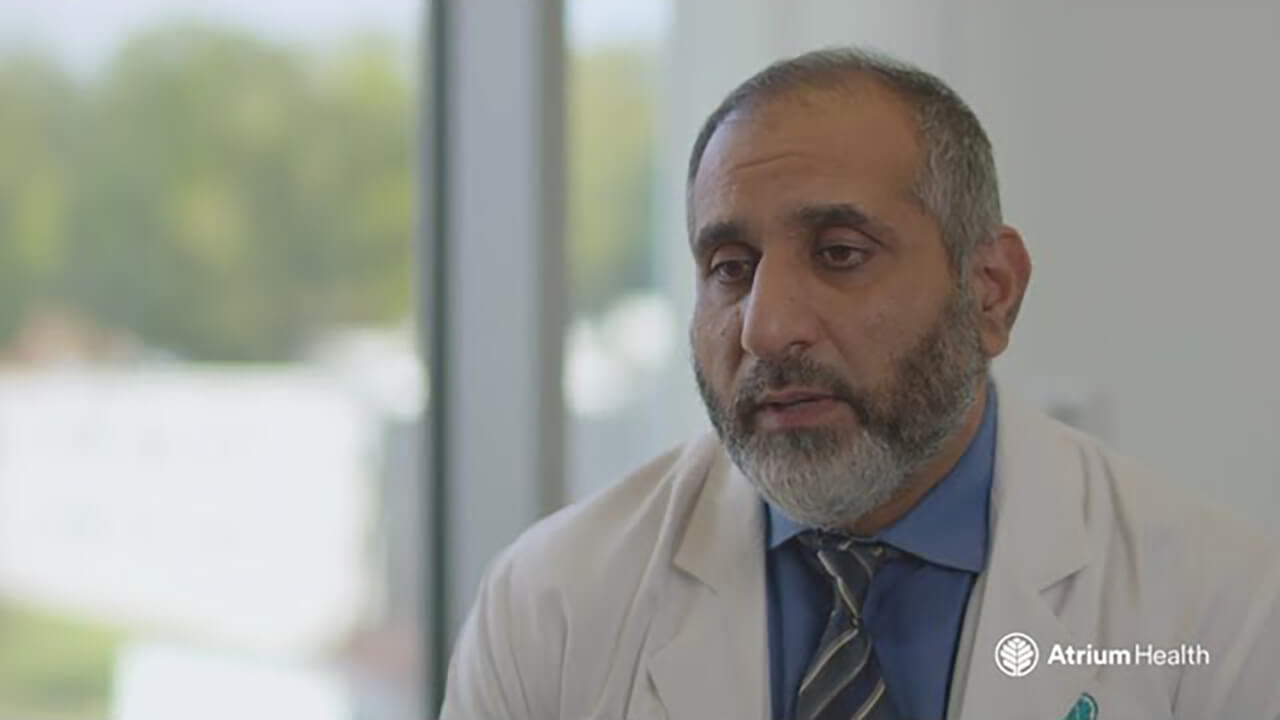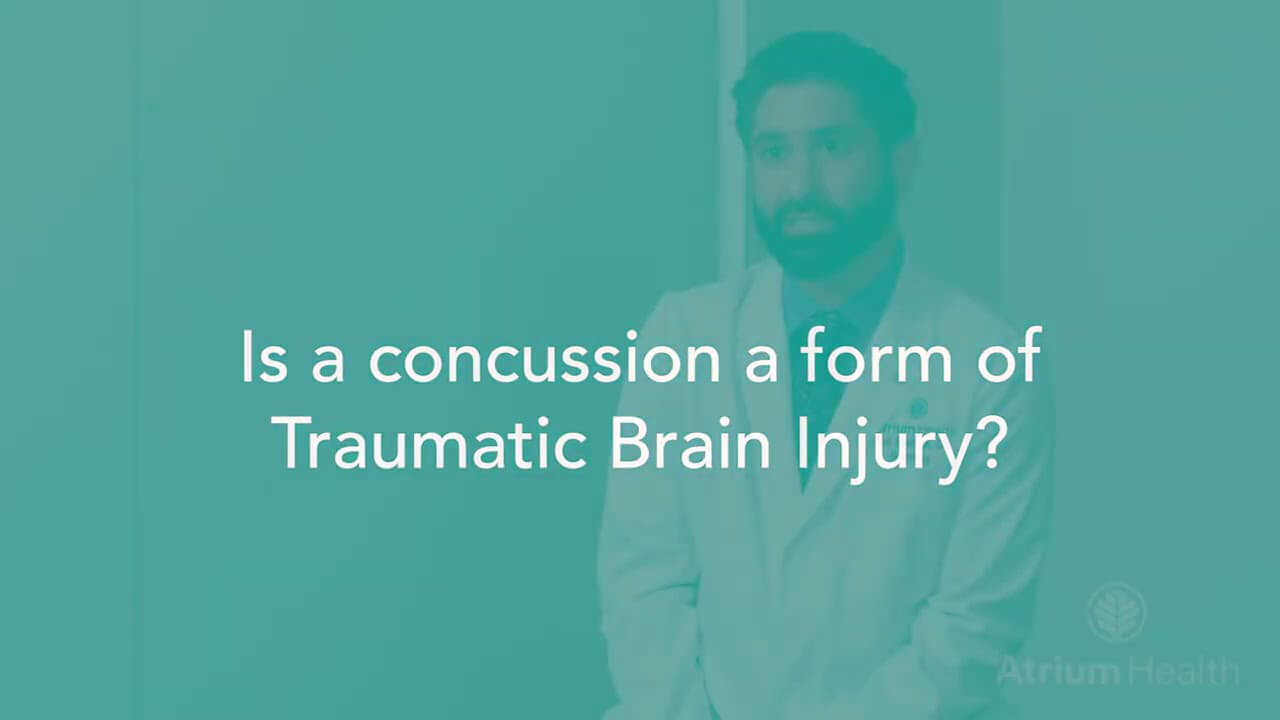Headache and Traumatic Brain Injury
If you have frequent or severe headaches, or you’re recovering from a traumatic brain injury (TBI), Atrium Health Neurosciences Institute is here for you.
Our headache and TBI program offers advanced diagnostics and treatment options tailored to your unique needs. Our highly trained team of specialists is committed to helping you manage your symptoms so you can enjoy a better quality of life.
Request an appointment
To request an appointment with an Atrium Health Neurosciences Institute neurologist, please call 704-446-1900.
Why choose Atrium Health?
-
Trusted expertise: We’re one of only a few multidisciplinary headache and TBI programs in the region. You’re in excellent hands with our experienced team of neurologists (including a sports and brain injury neurologist), psychologists and physical therapists.
-
Team approach: To ensure you get complete care for your unique needs, we work with your primary care doctor and other experts across Atrium Health – from neurosurgeons and pain specialists to occupational and speech therapists.
-
Innovative treatments: We conduct cutting-edge headache and TBI research to bring you the most promising treatments as soon as they’re available, using the latest headache remedies to give you the best results.
-
Whole-person care: We know treatment goes beyond finding the right medication. We look at how factors like stress, mood, exercise, sleep and diet may affect your pain and will tailor solutions that reduce or relieve your symptoms.
Patient care – what we treat
We treat all types of headaches and TBI. Our care can help with physical, mental and emotional symptoms, whether they’re short-term or long-lasting.
Our first step is to pinpoint what’s causing your symptoms. We complete a full evaluation to provide an accurate diagnosis. In some cases, we also use advanced imaging and tests.
Some headache conditions we treat include:
- Migraine headaches
- Tension headaches
- Cluster headaches
- Trigeminal neuralgia
- Headaches during pregnancy
- Reversible cerebral vasoconstriction syndrome (RCVS)
- Headache and migraine after TBI or concussion
- Low and high cerebrospinal fluid (CSF) pressure headaches
- Head, facial, neck and TMJ pain
- Headache-related dizziness
- Other rare headache disorders and related conditions
Some TBI-related conditions we treat include:
- Concussions
- Sports-related concussions from all types of sports (amateur and professional athletes)
- TBI in active-duty military and veterans
- Whiplash and neck injuries
- Issues with eye and balance control after TBI
- Post-traumatic stress and mood changes
- Chronic traumatic encephalopathy (CTE)
Treatments
Our goal is to help you get back to doing the things you love. Our experts work with you to create an effective personalized care plan that may include a combination of therapies.
Some of the treatments we offer include:
- Aromatherapy for headache
- Battlefield acupuncture
- Botox injections
- Cognitive behavioral therapy (CBT)
- Epidural blood patch for CSF leaks
- Infusion therapy (medication through an IV)
- Nerve blocks, including sphenopalatine ganglion (SPG) blocks and peripheral nerve blocks
- Neuromodulation devices
- Physical therapy
- Prescription medicines
- Radiofrequency ablations
- Surgery and radiation therapy for trigeminal neuralgia
- Tendon injections
- Trigger point injections
Research
Our neurological expertise is powered by leading-edge research. We apply the latest findings in real time to provide the best possible care. And we continually participate in innovative studies to better understand what causes headaches and migraines and look for potential cures.

Find a clinical trial
Through our in-house neurosciences research, we give patients access to potentially breakthrough therapies.
Use our search tool to find current clinical trials. To learn more about our available studies, talk to your doctor.
Search clinical trialsMake a referral
When you refer a patient to us, we keep you involved and up to date throughout their care. To make a referral, call our dedicated physician referral line at 704-468-0101 or send a fax to 704-468-0022.
Frequently asked questions
Headaches occur for a variety of reasons. Determining the type of headache you’re having helps us find out what’s causing it.
There are 2 main types of headaches: primary and secondary. With primary headaches, like migraine and tension headaches, the head pain itself is the problem. With secondary headaches, the pain is a symptom of another medical condition, like a concussion or sinus infection.
Some common triggers of primary headaches are:
- Alcohol use
- Bright lights
- Dehydration
- Eyestrain
- Hormonal changes
- Hunger
- Lack of sleep
- Medication
- Noise
- Stress
- Strong smells
- Weather changes
We encourage you to keep a headache journal that tracks the date, time and onset of your headache, as well as other factors like what you were doing when it started and any treatments you used. This detailed record of your headaches can help us identify your triggers and find effective solutions.
Migraines are extremely painful, recurring headaches that are sometimes accompanied by other symptoms such as visual disturbances or nausea.
Migraines usually occur as isolated “attacks” that can last from 4 to 72 hours. A migraine attack may happen once a year or several times in a week. Migraines are considered chronic when they occur at least 15 days in a month, often on a daily or near-daily basis.
Migraines tend to begin on the side of the head and may spread to both sides. Migraine symptoms include pain that’s throbbing, pounding or pulsating and may be accompanied by:
- Nausea or vomiting
- Dizziness, lightheadedness, or vertigo
- Loss of appetite
- Fatigue
- Visual disturbances (aura)
- Sensitivity to light, noise or movement
- Irritability
Migraines most often affect women ages 20 to 45. Women are nearly 3 times more likely to get migraines than men. While researchers don’t know exactly what causes migraines, there may be a genetic link. More than half of people with migraines have an affected family member.
Migraines can be debilitating, but relief is possible. To make an appointment for migraine treatment, call 704-446-1900.
The most common type of headache is a tension headache. Tension headaches can last anywhere from a few minutes to several days, with symptoms like:
- Mild to severe pain
- Pain on both sides of the head
- Dull or squeezing pain, like there’s a tight band around your head
While the symptoms of a tension headache and migraine can be similar, tension headaches usually aren’t accompanied by nausea or vomiting, and the pain doesn’t increase with routine physical activity such as walking or climbing stairs.
Women are more likely to get tension headaches than men. Nearly everyone will have at least 1 tension headache at some point in their lives and more than a third of people will experience a tension headache each year. Tension headaches are considered chronic when they happen 15 or more days per month for at least 3 months.
To make an appointment for tension headache treatment, call 704-446-1900.
Cluster headaches are recurring periodic cycles (“clusters”) of headache attacks. A single attack is usually brief, lasting 15 minutes to 3 hours, but is extremely painful. Clusters may occur daily or multiple times a day for weeks or months.
Cluster headache symptoms include:
- Burning, sharp, stabbing or steady pain
- Pain on one side of the head, generally around the eye
- Red or watering eyes
- Eyelid drooping or swelling
- Nasal congestion (stuffy nose)
Cluster headaches are rare, affecting less than 1% of the population. More men than women are affected. These headaches can occur at any age but are most common in the 20s through middle age.
To make an appointment for cluster headache treatment, call 704-446-1900.
Trigeminal neuralgia is a nerve disorder that causes a stabbing or electric shock-like pain in parts of the face.
When trigeminal neuralgia symptoms can’t be controlled with medication, surgery and radiation therapy can be effective treatment options. We offer these services in collaboration with our expert neurosurgery team and radiation oncology providers at Atrium Health Levine Cancer Institute.
To make an appointment for trigeminal neuralgia treatment, call 704-446-1900.
A TBI, or traumatic brain injury, is an injury to the brain caused by a strong hit to the head or body. Most often, it’s caused by a motor accident, fall or sports injury.
Depending on the onset of symptoms, TBIs are classified as mild, moderate or severe.
A TBI can affect how your brain works and how you feel. While most injuries may get better with standard care, more severe injuries require specialized treatment.
Our program can help with a range of post-TBI symptoms, including problems with thinking, balance, mood, memory, seizures, headaches and more. We work with each patient to create a customized treatment plan for their needs and goals.
If you’re recovering from a TBI or participate in organized sports, ask your primary care provider if seeing a sports neurologist is right for you.
Headaches are a common symptom after a head and neck injury, like from a car accident or sports injury. These headaches are called post-traumatic headaches.
The majority of post-traumatic headaches start within 7 days of a head injury. Symptoms may improve within 7 to 28 days but can persist for much longer. These headaches can often mimic migraines and cervicogenic headaches (headaches that start in the neck).
Post-traumatic headache symptoms vary from person to person.
Some possible symptoms include:
- Mild to severe head pain that may be pulsing or worsen with activity
- Dizziness
- Insomnia (trouble sleeping)
- Poor concentration
- Memory problems
- Sensitivity to light or noise
- Nausea or vomiting
- Fatigue
- Mood or personality changes, like depression or nervousness
- Problems with balance and dizziness
If you’re experiencing headaches after a head injury, it’s important to see a doctor to get the right treatment and make sure everything is OK.
If you have any concerns about your headaches, talk to a health care provider. They can rule out serious conditions and help you get relief.
Typically, you can start with your primary care doctor. If you need more specialized treatment for severe or chronic headaches, ask your doctor to refer you to our program or call 704-446-1900 to request an appointment with one of our headache doctors.
Most headaches are not a medical emergency. But sometimes, a headache can be a sign of a severe or life-threatening medical problem.
Call 911 or go to the nearest emergency department if you experience any of the following symptoms:
- Your headache comes on suddenly and is explosive or violent.
- Your headache is accompanied by fever, stiff neck, severe neck pain, persistent vomiting or unrelenting diarrhea, loss of vision, weakness, loss of consciousness, confusion, seizure or trouble speaking.
- You experience a headache after a head injury, especially if the headache gets worse.
- You cannot tolerate your headache even after taking your rescue medications.
Our Providers
Meet our providers and find the one for you. Use the filters to narrow your search.


